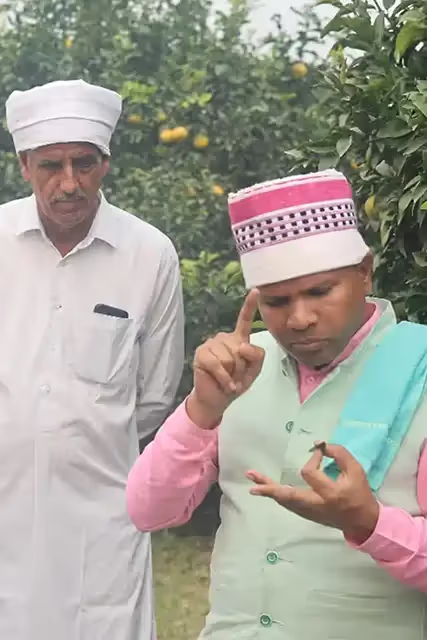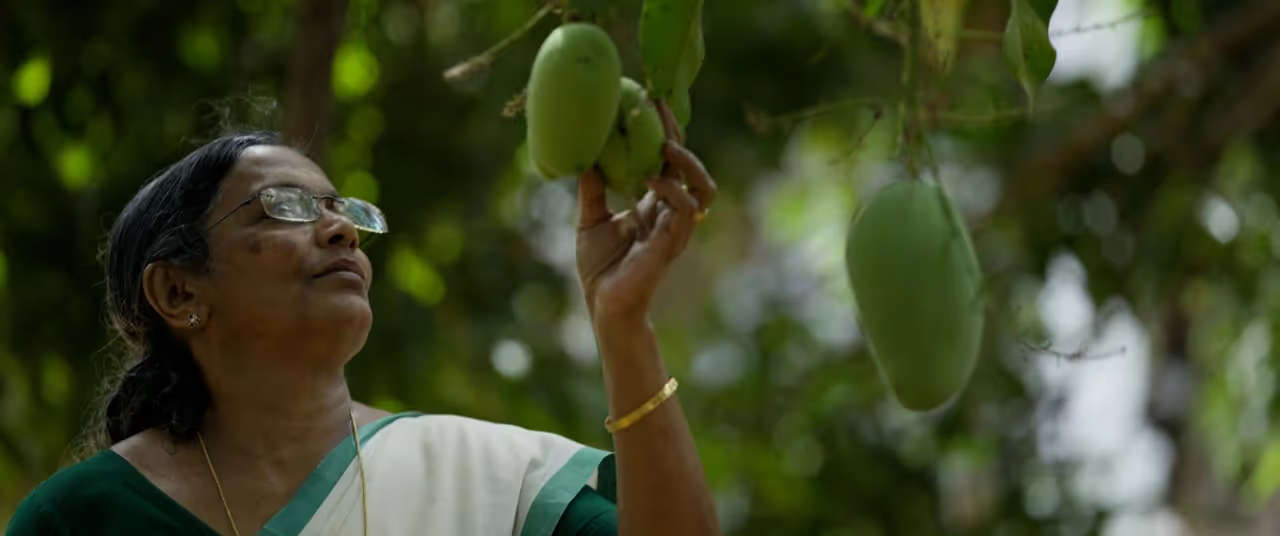The TCBT method boost yields and soil health






There was a time when people relished healthy, delicious meals made from fresh produce harvested from naturally cultivated fields. However, as farmers adopted chemical fertilisers and pesticides, toxins began infiltrating the soil and food, often with little awareness of their harmful effects. Recognising the damage, many farmers are returning to natural methods, including Tarachand Belji, a pioneer of the natural farming movement from Bhopal. Guided by his principle, “Agriculture has to be sustainable, both in terms of boosting productivity and maintaining ecological harmony,” Belji has been promoting Tarachand Belji Techniques (TCBT) since 2009, following his experiments with soil health, fertilisers, pesticides, and water management.

Learning curve
In 2005, Tarachand’s search for better farming methods led him to Nana Ji Deshmukh, his mentor at the Krishi Vigyan Kendra in Ganiwa and Majhgawan under the Mahatma Gandhi Chitrakoot Gramodaya Vishwavidyalaya. He had seen the results of both conventional chemical farming, practiced by his father, and organic farming, which mainly used vermicompost and simple composting techniques. He noticed that chemical farming led to poor yields, unhealthy soil, and crop diseases, while organic farming had its own limitations. This led him to experiment with natural farming methods. During his trials, he connected with agricultural scientists from Kanpur, Banaras, and Deepak Sajde, who introduced him to ‘Panchmahabhut Krishi’.
Agriculture has to be sustainable, both in terms of boosting productivity and maintaining ecological harmony.
“TCBT is a philosophy that honours the land, fosters sustainability, and supports a regenerative agricultural system based on respect for nature,” he said. Under the guidance of members of the All-India Organic Forum Association, Tarachand studied 13 foundational texts, including ancient scriptures like Vrikshayurveda, Krishi Geeta, and Kashyapi Krishi, which reveal age-old wisdom on natural farming.
Establishing models
“In three years, I established multiple organic farming models in Zari, Bhatni, Khamariya, and Dhodar villages,” Tarachand said. Building on his knowledge of both chemical and organic farming, Tarachand founded the Prakritik Krishi Shodh Sansthan in 2009. He and 100 farmers cultivated a 13-acre plot in Kharmaria village, Narsinghpur district, where the fields were overrun with parthenium weed (gajar ghas). Combining ancient agricultural principles with modern challenges, Tarachand and his team conducted quarterly evaluations to track progress. The use of natural compounds, such as panchgavya (a mixture of cow-based ingredients) and ‘jeevanu jal’ (enhancing microbial activity), led to encouraging results.
“By 2022, our team achieved record-breaking yields across 18 crops. We harvested 1,000 gourds from a single plant and 15 quintals of mustard from just 50 grams of seeds. I cultivated wheat, rice, green peas, lentils, and guava,” he said.

“After adopting Panchmahabhut Krishi and achieving 20 to 30 percent higher harvests, I decided to create awareness to encourage farmers to try this healthy approach,” Tarachand said.
‘Agnihotra’ or puja is performed for the fields, and the ashes are sprayed wherever possible. Farmers use methods like ‘beejamritham’ to strengthen seeds, ‘jeevamritham’ to fertilise the soil, and mulching to shield bacteria from sunlight. Soil tests check humidity, pressure, biomes, beneficial bacteria, and pests, and rejuvenation is carried out when needed.
Also read: The fight to save India’s small rivers
In harmony
“Panchmahabhut Krishi is all about aligning with the elements of nature–earth, water, fire, air, and space. It enriches the soil and nourishes crops with energy in harmony with nature,” said Siju Sivanand, an aviator turned farmer in Kollam, Kerala. He cultivates bananas, chillies, ginger, turmeric, yam, tapioca, lady’s fingers, greens like spinach, gourds, and fruits on his farm. “The soil naturally contains nitrogen, phosphorus, and other nutrients. Microbes protect plants. Just look at forests–natural methods are more than enough,” he said.
"Chemical farming, while initially productive, drains soil carbon, disrupts the microbiome, and relies on unsustainable practices," said Siju. "I noticed my soil was hard, and the yield was low. I consulted many experts, but only TCBT, recommended by my mentor, addressed all my concerns. TCBT has helped loosen and enrich the soil, boost productivity, and reduce pest problems. Previously, during rains, my ginger would rot due to waterlogging, but after using TCBT, there's better seepage, increased microbial activity, and improved results."Siju said, running his fingers through the fertile soil. "A small amount of natural fertilisers and pesticides is enough to cover large areas," he added.

National Mission
With the launch of the National Mission on Natural Farming in November, 34 lakh farmers have adopted natural farming practices, covering 22 lakh hectares of land. The Centre now aims to involve one crore farmers in natural farming through institutions and grama panchayats.
Tarachand is on a mission to encourage more farmers to embrace organic farming. Having trained over 200,000 farmers in sustainable agriculture, he focuses on soil health, pest management, and eco-friendly techniques. His hands-on training programmes and talks empower farmers across Punjab, Gujarat, Rajasthan, Uttar Pradesh, and other states.
He has also played a role in shaping Madhya Pradesh's organic farming policy and frequently delivers awareness sessions at agricultural universities. "I was a trainer at GB Pant University of Agriculture and Technology in Pantnagar, Uttarakhand," he said. "Realising the need to go organic, I started reaching out to farmers in other states, helping them transition to toxin-free farming."
Tarachand's efforts earned him invitations to G20 sessions in Mumbai and Varanasi in 2023.
Farmer voices
"Balancing the five elements helps curb pests, and the produce is healthier and tastier than those grown chemically," said Sumit Rana, a farmer in Punjab. "I discovered TCBT on YouTube and started practising it to ensure my family eats healthy, nutritious, and tasty food while treating nature kindly. I switched recently, and the results are promising," he added.
"I also came across TCBT on YouTube," said Vijay Barfa, a techie-turned farmer from Bhopal. "It’s a form of agriculture rooted in divine energy and ecological balance, and it works. As a large-scale farmer, I plan to transition to natural farming step by step."
TCBT is also promoted through Soul Society for Organic Farming Research and Education. “It’s a digital company comprising farmers, researchers, technologists, and trainers, with Tarachand Belji as cofounder, chief mentor, and ideologue, founded in October 2021,” said co-founder and CEO Ritesh Agarwal. Ritesh’s long association with Tarachand and the drive to improve the food supply chain with genuine organic produce inspired him to create Soul Society. The organisation educates farmers on natural farming and offers guidance every step of the way, including marketing.
“Soul helps farmers assess soil health, provides organic agro inputs to nourish it with essential nutrients and microbes, and boosts productivity and resilience,” said Ritesh. “We’ve conducted over 200 training programs, and around 80,000 farmers from 20 states have adopted it.”
According to Ritesh, the direct supply chain from natural farms to consumers aims to boost the local economy, helping farmers reinvest in their farms and offer natural food to people. Extensive research is done to improve product quality and farming practices.
“We’ve developed e-commerce channels to supply products to farmers and offer expert advice to those keen on natural farming,” said cofounder Sharad Bhat, who drives the digital strategy. After working at Infosys, TCS, and Ola, Sharad wanted to give back to society and believed organic farming was the ideal way to do so.
Also read: The tribal seed guardians of Dindori
Tech-based solutions
“Soul offers education, training, and products both online and offline through partnerships with institutions, including government and farmer producer organisations. We help farmers transition from chemical-based to natural farming by offering tech-based solutions that can be adapted quickly. I also handle human resources,” Sharad said. Soul provides farmers with mobile app access to track crops, receive expert advice, and learn natural farming techniques.
Soul supports marketing by buying produce from farmers and selling it directly to customers at fair prices.
“We’ve worked on over 60,000 acres across 20 states and convert about 500 acres to organic farming every month. This could be the largest network of organic growers in India,” Ritesh said.
Tarachand and his team envision turning one million acres organic by 2025, increasing farmers’ income and productivity, and transforming farmers into eco-warriors for a sustainable future.
{{quiz}}
Explore other topics
References




.avif)






